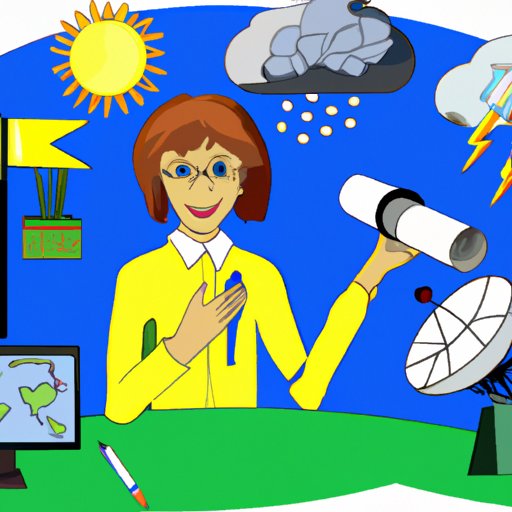Introduction
Meteorology is the study of the atmosphere and its phenomena. It involves analyzing and predicting weather events, such as storms, droughts, and floods. Becoming a meteorologist requires specialized education and training, but it can be a rewarding career with a variety of opportunities.
Educational Requirements
The first step in becoming a meteorologist is to earn a degree in the field. Most meteorologists have a bachelor’s degree in atmospheric sciences or a related field, such as physics or mathematics. Some positions may require a master’s degree or higher. It is also possible to become certified as a professional meteorologist through organizations such as the American Meteorological Society (AMS). To become certified, candidates must complete an approved course of study, pass an exam, and meet other requirements.
In addition to formal education, many meteorologists receive additional training through workshops, seminars, and internships. These programs provide hands-on experience and help meteorologists stay up to date on the latest research and technologies.
Types of Meteorology
Meteorologists specialize in different types of meteorology, such as synoptic, dynamic, climate, and mesoscale. Synoptic meteorology focuses on short-term weather patterns and forecasting. Dynamic meteorology is the study of how air moves within the atmosphere. Climate meteorology examines long-term trends in weather and climate. Mesoscale meteorology looks at small-scale weather systems, such as thunderstorms.
Tools and Technologies Used by Meteorologists
Meteorologists use a variety of tools and technologies to observe and analyze weather phenomena. Weather satellites are used to collect data from around the world. Radar technology helps meteorologists track storms and other weather systems. Computer modeling software is used to create forecasts and simulations.
Developing Forecasting Skills
In order to become a successful meteorologist, it is important to develop strong forecasting skills. This includes observing weather phenomena, studying weather patterns, and practicing forecasting. Observing weather phenomena requires careful observation and analysis of data. Meteorologists should study seasonal patterns, global circulation models, and other weather-related concepts. Practicing forecasting helps meteorologists hone their skills and gain confidence in their predictions.
Conclusion
Becoming a meteorologist requires specialized education and training. Meteorologists specialize in different types of meteorology and use a variety of tools and technologies to observe and analyze weather phenomena. Developing forecasting skills is essential for success in the field. With the right education and training, meteorology can be a rewarding and exciting career.
(Note: Is this article not meeting your expectations? Do you have knowledge or insights to share? Unlock new opportunities and expand your reach by joining our authors team. Click Registration to join us and share your expertise with our readers.)
